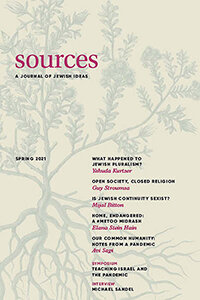Where Stories Come From
Animation: stusufrin.com, music: Elliot Middleton Memories of Old
Poem
By Ida Maze
Translated by Miriam Udel
(Ballad)
Somewhere very far away,
Where wagons will not go —
There stands a little cottage
As it’s stood for years, just so.
Sitting quiet and abandoned
Doors and shutters bolted shut,
Days and years pass; only wind blows
Through the chimney of the hut.
Everybody’s known for years:
Its people all have gone away
Only wind blows in the chimney
Not a soul has come to stay.
One night when all are sleeping,
And the wind is sleeping too —
Lights come on inside the cottage
And smoke wafts up the flue.
Door and shutter are unbolted.
In a corner, by a light,
Sits a grandpa learning Torah;
A child listens with delight
To Grandpa’s tales of wonder-beams,
Absorbs them through her dreams.
Hard by the hearth, a spinning wheel;
From silken thread, so thin and soft,
Grandma spins her lovely stories
And, with the smoke, sends them aloft.
The smoke takes up the grandma’s stories,
Repeats them to a wind beguiled —
On its wings the wind will spread them,
Giving some to every child.
פון וואַנען נעמען זיך די מעשיות
ערגעץ ווייט, ערגעץ ווייט,
ניט מיט פורן צו דערפאָרן,
שטייט אַ הייזעלע אַ קליינס,
שוין פון פילע לאַנגע יאָרן.
טיר און לאָדן אויפן ריגל –
שטיל דאָס הייזל און פאַרלאָזן,
דורך די טעג און דורך די יאָרן –
נאָר אין קוימען ווינטן בלאָזן.
ווייסן אַלע שוין פון יאָרן,
אַז דאָס הייזל איז פאַרלאָזן,
און אַז וווינען, וווינט דאָרט קיינער,
נאָר אין קוימען ווינטן בלאָזן.
טרעפט אַ נאַכט, ווען אַלע שלאָפן,
און די ווינטן שלאָפן אויכעט,
ווערט אין יענעם הייזל ליכטיק,
און פון קוימען דאָרטן רויכערט.
טיר און לאָדן אויפגעריגלט –
אין אַ ווינקל ביי אַ שיין,
זיצט אַ זיידע לערנט תורה,
זיצט אַ קינד און הערט זיך איין
צו דעם זיידנס ווונדער-מעשיות,
און חלומט זיי אין זיך אַריין.
ביי אַ קוימען, ביי אַ שפּין-ראָד,
פון זייד די פעדים, דין און ווייך,
שפּינט אַ באָבע שיינע מעשיות,
און צעשיקט זיי מיטן רויך.
נעמט דער רויך דער באָָבעס מעשיות
גיט זיי איבער צו דעם ווינט –
צעשפּרייט דער ווינט זיי אויף זיינע פליגלען
און טיילט זיי אויס צו יעדן קינד.
Translator’s Note
Ida Zhukovski was born in a village south of Minsk in 1893 to Simon, an innkeeper, and his wife, Musha. The family was related to the “grandfather” of modern Yiddish literature, Mendele the Book Peddler. Though Ida had only about a year of formal schooling, she listened to her brothers reciting their lessons and began a lifelong habit of acquiring her own education.
In 1905, her family emigrated to New York and settled permanently the following year in Montreal, Canada. In 1912, she married Alexander Maze (Massey), a traveling salesman. The couple had three sons. She began to write poetry in her teens but published her first volume, A Mame (A Mother) in 1926, following the death of her eldest son, Bernard, at age ten.
Writing in Yiddish for both children and adults, Maze authored four books of poetry and an autobiographical novel, in addition to numerous poems and essays published in periodicals in the United States, Canada, Poland, Argentina, Mexico, and Israel. She also co-edited a literary quarterly, Heftn (Notebooks), from 1935 to 1937.
Maze served many authors as both a mentor shepherding their work to publication and also as something of a patron, providing lodging and food in her own family’s home when needed. During and after World War II, she aided in fund-raising and refugee resettlement. Her son, the literary scholar Irving Massey, in his highly personal study Identity and Community, describes her activities as “the equivalent of a full-time job as social worker, placement officer, psychiatric counselor, and fund raiser, not to mention copy editor and literary agent.” Maze died in Montreal in 1962.
With an emphasis on rhythm and regular rhyme, Maze’s poems can appear deceptively simple. “Where Stories Come From” offers a rich ars poetica for Jewish storytelling, originating with generations past and holding in tension the forces of continuity and disruption (signified by the abandonment of the pre-urban cottage home). I recognize in this poem a deftly drawn miniature for my own project of retrieving and disseminating the treasures of Yiddish children’s literature, bolted away by decades of neglect. Now translation must do the work of the wind in spreading them to every child.
This article appears in Sources, Spring 2021
Miriam Udel, associate professor of Yiddish at Emory University, is the author most recently of Honey on the Page: A Treasury of Yiddish Children’s Literature (NYU Press, 2020).



